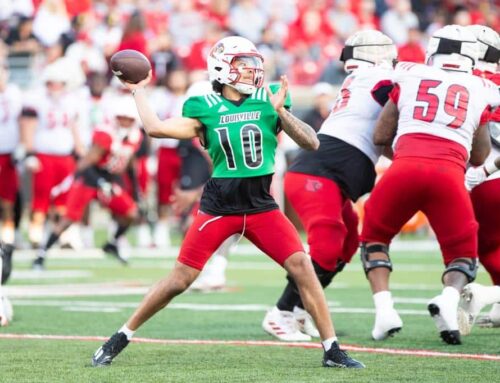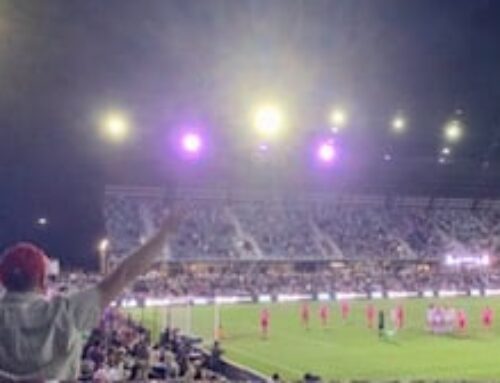By Dalton Ray–
“Freshman year I was just surviving, my vision could only go ahead three weeks from where I was. Practicing was completely different from what I came from, training was more intense, on top of living by myself and going to school. I couldn’t see myself where I am now as a freshman.”
Fast forward three years and Grigory Tarasevich is on a plane heading to London to swim in the European Championships. All of this is preparation for the 2016 Olympic Games in Rio. A Russian native, Tarasevich will be competing in the 100-backstroke and 400-meldey relay for Russia’s national team in August.
The journey to become an All-American swimmer at the University of Louisville and an Olympic swimmer began as a child. Growing up in Omsk, Russia, Tarasevich’s parents both were swim coaches. When no one could watch him as a kid, Tarasevich would spend time at the pool. Sooner, rather than later, he would start to swim.
“I’ve been swimming since I was six and as a kid my parents would just say, ‘Oh you can just come to work with us’ and that happened a lot,” Tarasevich said. “I started swimming and my parents thought that I might do pretty well. My dad was my coach so that had its ups and downs but after a few years I made it to the European Junior World Champs.”
The European Junior World Championships is an annual swimming competition that sees some of the best young swimmers in Europe under-18. Tarasevich admits his first appearance wasn’t his best performance, but 2013 would see a different outcome.
“The next year in 2013, it was my best big stage performance. I won both my events (50- and 100-back) in the European Juniors and then I went to World Junior Championships,” Tarasevich said. “There I set a then-junior world record in the 50-backstroke. It was actually at that time Louisville contacted me about swimming.”
Tarasevich’s recruitment wasn’t like what college athletes are used to. Because Tarasevich lived in Russia and was in school, making visits to schools in the United States wasn’t an easy task. Between the expenses of coming to the US and lack of time, Tarasevich’s connections landed him at U of L.
“I swam in Florida over the summers because there was a Russian coach there so my family thought it be good to travel and train. He knew coaches on U of L’s team and they started contacting me after that,” Tarasevich said. “I really wanted to come to the US because I could swim at a high level and pursue the degree I’ve always wanted. In Russia that’s highly unlikely – you basically have to do one or the other.”
When it came to picking a school, U of L wasn’t the only option but it was the right one.
“I had a lot of teams contact me but I really just didn’t have time at that point to visit them. I’ve heard about Louisville’s swim team success and their engineering program was my main focus,” Tarasevich said. “So after looking into both of those I wanted to go farther. Honestly, I looked at Google Maps to check out the campus, what part of town it was in, how the city was, how life was, things of that nature. It fits me well, plus red is my favorite color so I’ll always have nice gear.”
Once Tarasevich got to U of L, he didn’t have to only adjust to living by himself and managing time, but how he practiced as well.
“The team aspect of swimming here was a big adjustment,” Tarasevich said. “In Russia, the teams you swim with are really small, it’s only three or four players per coach. When you’re here you have to do everything together. Morning practice, lifting, second practice, team building. It’s much different and took getting used to.”
To train for the Olympics, Tarasevich even chose to stay in Louisville because of the team atmosphere.
“I had a choice to train with the national team or train here. I chose to stay here because the mental aspect of training, school and managing time will help me more,” Tarasevich said. “Doing all these things will help me stay focused compared to not doing as much if I trained with the national team.”
For Tarasevich it wasn’t until college when he realized how close he was to becoming an Olympic athlete.
“My freshman year I swam in the Winter National Championships and there were three or four Olympic medalists in my heat,” Tarasevich said. “Everyone I was swimming against was huge, all of them looked so strong and I was so tiny. In that race, the guy who won broke an American record and just blew me out of the water. I didn’t want people to see me perform like that so that was the point where I told myself I was going to make a change.”
Tarasevich said he wanted to “get to the level” the other Olympic swimmers were at and he did. In April, he would compete in the the Russian Championships/Olympic Trials in Moscow. On such a big, national stage with multiple other Olympic swimmers Tarasevich says the mentality is a huge part.
“You can’t go in thinking, ‘These guys are the best in the world, what am I doing here?’ You just have to look at them as the competition,” Tarasevich said. “It’s easy to get caught up but you have to realize you can be just as good as the guys you’re swimming against. You have to put yourself and those swimmers in the same group then go compete.”
While being in the right mental mind state is key for swimming on a national stage, Tarasevich admits the amount of exposure during a race can get overwhelming.
“Having a nation watching you is just an insane amount of pressure, I don’t even think about it. Even when I’m here at home meets swimming I ask myself, ‘What am I doing right now?’ and that’s such a smaller venue,” Tarasevich said. “You find yourself stressed out and questioning random things and that’s something I’m still working on how to just see it as a race.”
Just as the pressure sets in, there is a time where everything clicks for Tarasevich.
“Everything just switches off when I’m walking out to the blocks while they’re announcing the names just before a race. Everything just cuts off, I don’t feel nervous, I don’t feel anything. I’m just swimming, I’m having fun and excited,” Tarasevich said. “I don’t know why it happens in that moment but I just ask myself, ‘Why now?’ because the hours leading up I’m so tense. High level athletes are able to just turn it on and off but I’m still getting to that point.”
With all the pressure of being an Olympic athlete, being a full time student and just the every day struggles of deciding what to eat, Tarasevich needs a time to wind down. The senior mechanical engineering major turns to music to relax.
“I play drums, I have an electric drum set and I just love playing. I don’t do it to try and make music or anything, it just relaxes me,” Tarasevich said. “Also I love going to concerts. Live music is one of my favorite events to go to. Just watching everything come together and see how everything meshes as one is awesome.”
Tarasevich is one step closer to realizing a dream come true. To become an Olympic athlete is one thing but to win a medal is another.
“To place and take home a medal would just be proof of the work I’ve done and put it. Basically like a stamp,” Tarasevich said. “Not only myself and work I’ve put in but the people who have helped me along the way. It would be a representation of all the work I’ve put in up to this point. All the years, long practices, cold mornings coming to training and getting in the cold pool. It would be a presentation of that, if I’m lucky enough to earn it.”
As the Olympics are creeping up, the realization of possibly winning that medal is becoming more and more in reach. When asked if he would throw up the L if Tarasevich were to win a medal, he quickly responded, “damn straight.”
The 2016 Olympics in Rio begin on Aug. 5.
Photo Courtesy / Louisville Athletics





